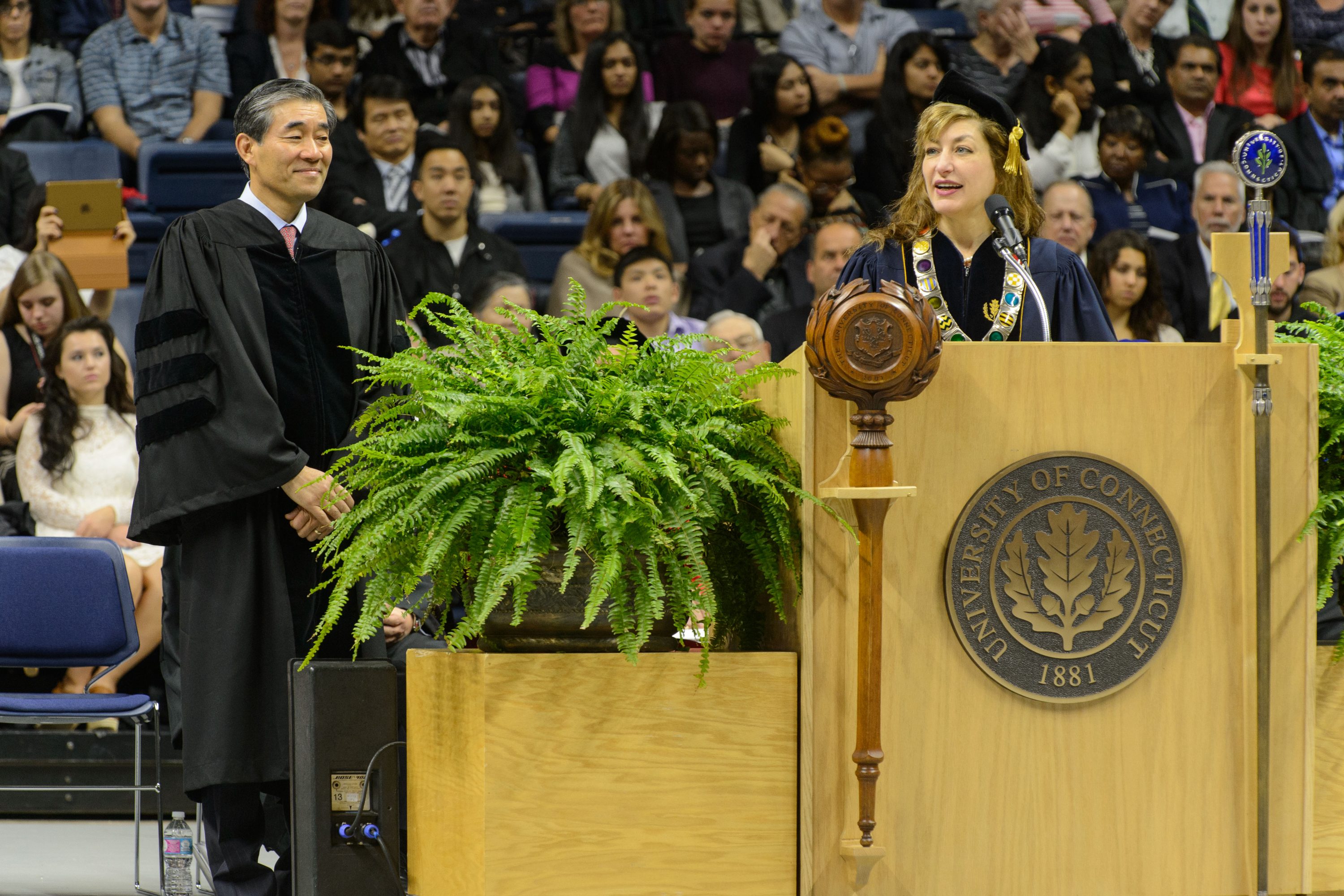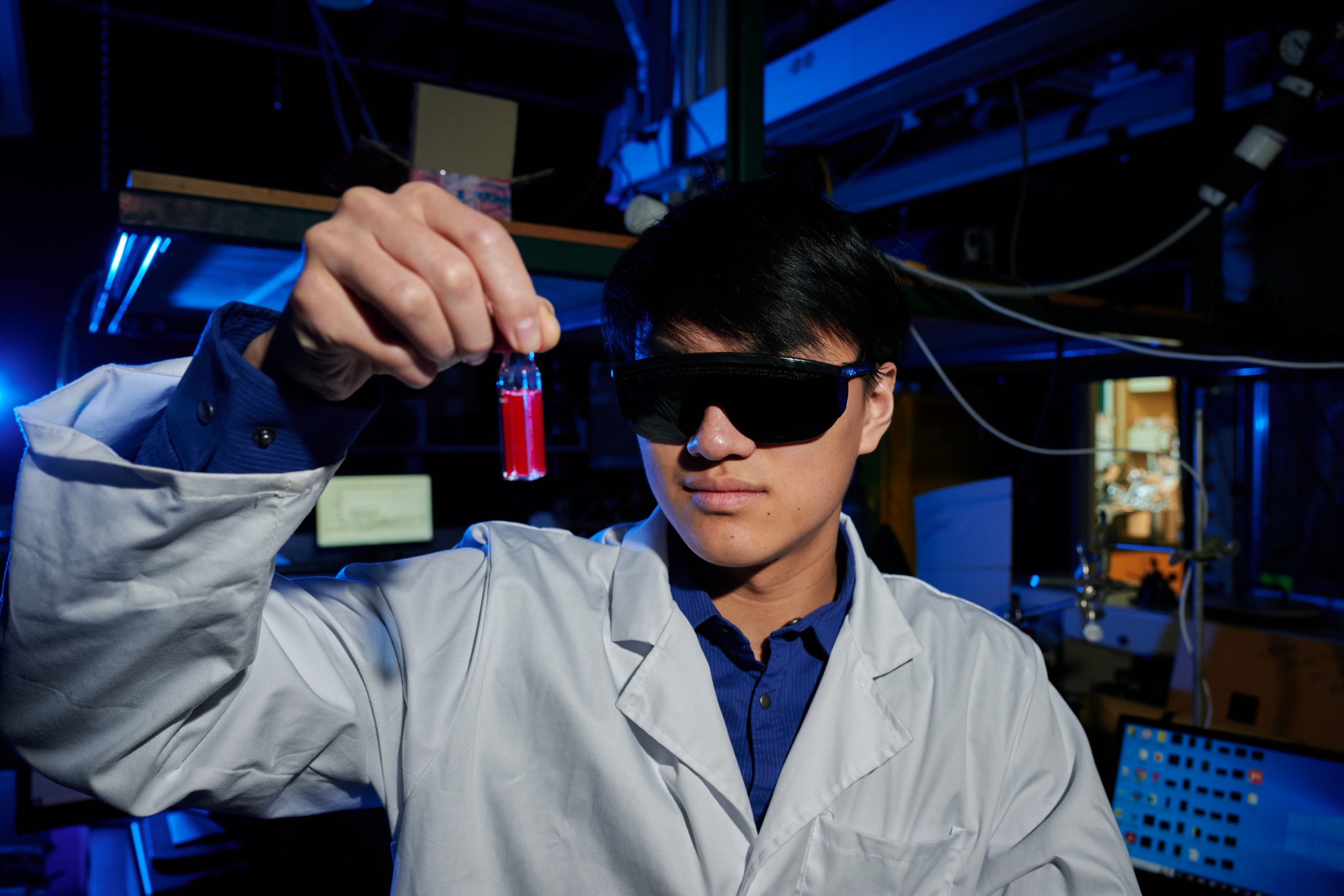Whether sequencing the human genome or developing new culinary concoctions; whether writing award-winning plays or learning the secrets of noncoding RNA; whether steering the course of The Hartford or United Technologies Corporation, the honored guests of UConn’s commencement ceremonies this year are leaders in their fields.
Honored guests include commencement speakers and honorary degree recipients. At UConn, individual schools and colleges hold commencement ceremonies for their graduates, each with different guests.
This year’s honorary degree recipients, bestowed in recognition of extraordinary and lasting distinction that represents the highest intellectual and moral values, include: Craig Venter, College of Liberal Arts and Sciences; David Bouley, College of Agriculture, Health and Natural Resources; Joan Steitz, Schools of Medicine and Dental Medicine; Douglas Elliot, School of Business; J. Michael McQuade, School of Engineering.
Speakers charged with the significant task of imparting life wisdom to graduates include: Lynda Mullaly Hunt, Neag School of Education; Thomas Loughman, School of Fine Arts; Emily Bazelon, School of Law; Susan Frampton, School of Nursing; Christopher Fortier and James Sarigianis, School of Pharmacy; Stuart Rothenberg, Graduate School.
Michael McQuade, School of Engineering, Saturday, May 6 at 9 a.m.
J. Michael McQuade is senior vice president, science and technology at United Technologies Corporation (UTC), a global leader in the aerospace and commercial buildings marketplace. He provides strategic oversight and guidance for research, engineering and development across UTC’s business units and United Technologies Research Center, the company’s innovation engine.
In addition to his leadership role at one of the world’s most prominent technology and manufacturing companies, McQuade has a longstanding commitment to public service, helping to shape the future of science, technology, and engineering through numerous university and governmental advisory boards. As a member of President Obama’s Council of Advisors on Science and Technology, McQuade helped focus, shape and communicate basic and applied research policy for the country. He served on the Secretary of Energy’s Advisory Board and is currently a member of the Defense Innovation Advisory Board, where he helps bring technological and cultural innovations from the private sector to the United States military.
McQuade began his professional career at 3M focused on research and development of high-end acquisition, processing and display systems for health care, industrial imaging and remote sensing. Transitioning to general management he served as president of Eastman Kodak’s Health Imaging Business before returning to 3M. Prior to joining UTC in 2006, McQuade served as Vice President of 3M’s Medical Division.
Susan Frampton, School of Nursing, Saturday, May 6 at 9 a.m.
Susan Frampton is the president of Planetree International, a non-profit advocacy and membership organization working with healthcare provider organizations in 22 countries to implement comprehensive person-centered models of care.
Frampton, a medical anthropologist and graduate of the University of Connecticut, has authored numerous publications, including three editions of “Putting Patients First.” She also wrote an opinion piece on patient engagement in research, published in the Journal of the American College of Radiology in December 2016 and served as lead author on the National Academy of Medicine’s “Harnessing Evidence and Experience to Change Culture,” released in January of 2017.
Frampton chaired the National Academy of Medicine’s Scientific Advisory Panel on the Evidence Base for Patient-Centered Care in 2016, and currently chairs the National Quality Forum’s National Quality Partners Leadership Consortium. She has served as co-chair of several National Quality Forum’s Action teams on advanced illness care, patient-family engagement, and hospital re-admissions.
She serves as vice-chair of the Governing Board for the WHO-CC International Network of Health Promoting Hospitals, and on the editorial board for the Journal of Compassionate Healthcare. In addition to speaking internationally on culture change, quality, safety, and the patient experience, she was honored in 2009, when she was named one of “20 People who Make Healthcare Better” by Health Leaders Magazine.
Christopher R. Fortier, School of Pharmacy Doctoral Program, Saturday, May 6 at 9 a.m.
Christopher Fortier is the chief pharmacy officer at the Massachusetts General Hospital in Boston. Fortier received his Bachelors in Pharmaceutical Sciences in 2001 and his Doctor of Pharmacy degree from the University of Connecticut in 2003. Following graduation, Fortier completed both a PGY-1 Practice Residency and a PGY-2 Health-System Pharmacy Administration Residency at the Medical University of South Carolina Medical Center in Charleston, SC. After completing residency he stayed on at MUSC as an Assistant Director of Pharmacy for 8 years before moving to MGH.
At Mass General, Fortier oversees a staff of over 400 pharmacists and pharmacy technicians and is responsible for an annual budget of $350 million. He leads all inpatient, ambulatory, and outpatient pharmacy services across the organization both on the main and satellite campuses across the Boston-metro area.
Fortier has given over 70 invited presentations taking him across the country and to international destinations such as Japan and the Middle East. He has published over 20 articles in pharmacy and medical journals, 3 book chapters, and 20 research abstracts. Additionally, Fortier serves as an Adjunct Associate Professor at the University of Connecticut School of Pharmacy, Northeastern University School of Pharmacy, and the Massachusetts College of Pharmacy.
Stuart Rothenberg, Graduate School, Saturday, May 6 at 1:30 p.m.
Stuart Rothenberg ’72 MA, ’77 Ph.D., has had an illustrious career as a political analyst and journalist that includes interviewing then-unknown candidates Barack Obama; John Edwards, former senator from North Carolina; and now-Congressman Paul Ryan of Wisconsin.
Rothenberg is senior editor at Inside Elections with Nathan L. Gonzales. He served for over two decades as the editor and publisher of The Rothenberg Political Report, a non-partisan political newsletter covering U.S. House, Senate and gubernatorial campaigns, and presidential politics.
He has been a frequent guest on “Meet the Press,” NBC TV’s “Today Show,” “This Week,” “Face the Nation,” “PBS NewsHour,” and “Nightline.” He served as a political analyst for CBS News, and prior to that, as a CNN political analyst for more than 10 years. Network executives and political pundits describe him as “articulate,” “authoritative,” and “plugged in.” He has also contributed to The Washington Post, The Wall Street Journal, and The New York Times. And in addition, he regularly pens a column for the Capitol Hill newspaper, Roll Call.
James Sarigianis School of Pharmacy, Saturday, May 6 at 4 p.m.
After completing a general practice residency at Rhode Island Hospital, James Sarigianis pursued a clinical pharmacist position at Yale New Haven Hospital (YNHH) and has been employed there since 1983.
In his early years at YNHH, Sarigianis was responsible for the planning and implementation of the institution’s first formal ordering process for chemotherapy, as well as in designing a centralized chemotherapy preparation area in the pharmacy. He later transitioned to a focus in cardiology, part of which involved participating in a formal multidisciplinary cardiac rehabilitation teaching program.
In his current role at YNHH, Sarigianis oversees the pharmacotherapy of patients in the nephrology and hemodialysis units, in general internal medicine units, and he works closely with physicians on a variety teaching services.
Sarigianis began precepting pharmacy students in 1994. Although he has precepted students from a variety of schools across the country, the far majority have been UConn students. He has also precepted pharmacy residents since 1999, when the YNHH pharmacy residency program was resurrected. Sarigianis has served on the YNHH Pharmacy Residency Advisory Board since 2010.
Sarigianis holds adjunct faculty appointments for the schools of pharmacy of the University of Connecticut and the University of Rhode Island. He established and co-chairs the annual Brian E. Miller Memorial Lecture in memory of a former colleague and friend.
Thomas Loughman, School of Fine Arts, Saturday, May 6 at 5 p.m.
Thomas Loughman is director and CEO of the Wadsworth Atheneum Museum of Art in Hartford, Connecticut. He assumed the role of the 11th director at the Wadsworth Atheneum in February 2016, just months after the institution completed a major renovation. Previously he served as the associate director at Clark Art Institute in Williamstown, Massachusetts from 2008 to 2016, as well as in a variety of curatorial, research and teaching roles in the field.
Loughman is a scholar of Italian art and has lectured and published particularly on art, architecture, patronage, and urbanism in early Renaissance Florence. Additionally, he has contributed to numerous exhibition catalogues on artists as diverse as Claude Monet, Jéan-Leon Gérôme, Jusepe de Ribera, and Nicolas Poussin. As a curator, he has spearheaded a number of projects highlighting Baroque art in Naples, printmaking in 20th century Philadelphia, a focus on sculptors as draftsmen, ancient bronzes from China, as well as the global tour of the Clark’s core collection. Other initiatives have focused on creating a corpus of early Italian paintings and the American Southwest, a course on Giotto Di Bondone, and an exhibition and related catalogue examining Sterling Clark’s career as a military officer and explorer in late Imperial China.
Loughman earned his AB from Georgetown University, where he was a George F. Baker Scholar; his MA from Williams College; and Ph.D. from Rutgers University, where he was a Fulbright Scholar and a Kress Fellow. He lives in the Hartford area with his wife and two daughters.
David Bouley, College of Agriculture Health & Natural Resources, Saturday, May 6 at 6 p.m.
David Bouley, born and raised near Storrs, was strongly influenced by life on his grandparents’ farm, which instilled a love of the land, an appreciation for fresh products, care in preparation, and the inspiration to cook and enjoy healthful meals. He studied at the Sorbonne and worked with some of Europe’s most acclaimed chefs, and gained additional experience in some of New York’s leading restaurants.
In 1987, Bouley opened his own restaurant, “Bouley,” in TriBeCa. He has been awarded a four-star review in The New York Times, and James Beard Foundation awards for best restaurant and best chef. Most recently, in 2015, Bouley was awarded the “The Best Restaurant in the United States” and and #15 in the world from Tripadvisor Traveler’s Choice Awards. Bouley also received 29 out of a 30 rating in Zagat. He has operated additional restaurants, and more recently established Bouley Botanical, an event space, learning center and commissary kitchen where The Chef & The Doctor dinner/seminar series attempts to better understand and educate about the connections between food selection, preparation and health.
In 2015, Chef Bouley was awarded the Gohan Society’s “Washoku Ambassador Award” for exemplifying the spirit of Washoku in his cooking and everyday life. “Washoku” means the “harmony of food” in Japanese; it is associated with an essential spirit of respect for nature that is closely related to the sustainable use of natural resources. He is currently writing a book called “Living Pantry.”
Douglas Elliot, School of Business, Sunday, May 7 at 9 a.m.
Through his acumen and leadership, Douglas Elliot has an impressive career as one of the top leaders in the insurance industry. Currently, he is president of The Hartford, a 200-year-old national leader in property and casualty insurance, group benefits and mutual funds. In this role, he has oversight for all of the company’s property & casualty lines of business, in addition to group benefits and claims. He has been responsible for property and casualty lines for commercial and group benefits since joining the company in April 2011 and was promoted to president in July 2014, adding oversight of personal lines to his role.
Previously Elliot was president and COO of The Hartford Steam Boiler Inspection and Insurance Company, president of Specialty Insurance, and rose through the ranks at Travelers to become COO for Travelers Property-Casualty and CEO of general commercial lines and personal lines for St. Paul Travelers upon the merger of those companies. Prior to this, he served in a number of leadership roles at Travelers.
Elliot has donated significant resources and time to UConn, serving on the School of Business Accounting Department Advisory Council. From 2007 to 2012, he served on the UConn Foundation Board of Directors. He currently serves as Chairman of the Board of Hartford Hospital. In addition, he is past chairperson of the MetroHartford Alliance IFS Cluster, as well as the Central and Northeastern Connecticut United Way Campaign.
Lynda Mullaly Hunt, Neag School of Education, Sunday, May 7 at 9 a.m.
Lynda Mullaly Hunt is a New York Times best-selling children’s author who began her career as a third-grade teacher in Hebron, Conn. Mullaly Hunt’s books have appeared on 36 state award lists thus far.
Mullaly Hunt’s first novel, One for the Murphys, released in 2012, was a winner of the 2010 Tassy Walden Award for New Voices in Children’s Literature, an American Booksellers Association New Voices Pick for 2012, a 2012 Nerdy Book Award winner, and an Editor’s Choice Book with Scholastic Book Clubs. It has been released in five languages.
Her second novel, Fish in a Tree, published in 2015, was selected as a 2016 American Library Association Schneider Family Book Award winner and as a 2016 Notable Book by the Association for Library Service to Children. In addition, it was a Global Read Aloud Choice for 2015, a School Library Journal Best Book for 2015, and a 2015 Nerdy Book Award winner. It has been released in 15 languages and is being adapted as a stage show in New York City.
Mullaly Hunt travels extensively to speak with teachers, librarians, and students across the country about the writing process and the importance of resilience. In addition to being a former teacher, she served as a scenario writing coach for the Future Problem Solving Program International. For 12 years, she also served as director of the New England Society of Children’s Book Writers and Illustrators Whispering Pines Writers’ Retreat.
Mullaly Hunt earned her bachelor’s and master’s degrees in elementary education in 1988 and 1997, respectively, from the Neag School of Education at the University of Connecticut.
Craig Venter, College of Liberal Arts & Sciences, Sunday, May 7, at 1 p.m.
Dr. J. Craig Venter is a biochemist-geneticist who is acknowledged, along with geneticist Francis Sellers Collins, as being a primary force behind the Human Genome Project. He independently mapped and obtained the entire DNA sequence of a human individual. This monumental effort transformed genetics, genomics and is spearheading the development of personalized treatment for major human diseases. One major medical genomics project that Venter has undertaken is to sequence tens of thousands of human genomes in order to better understand human longevity and thereby extend the human health span and its quality. He is also a pioneer in the field of synthetic biology and genomics. The interest in this emerging area is in the modification of microorganisms to produce biofuels and clean biochemical.
One of the most frequently cited scientists and author of more than 280 research articles, he is also the recipient of numerous honorary degrees, public honors, and scientific awards. These include the 2008 United States National Medal of Science, the 2002 Gairdner Foundation International Award, the 2001 Paul Ehrlich and Ludwig Darmstaedter Prize and the King Faisal International Award for Science. Venter is a member of numerous prestigious scientific organizations including the National Academy of Sciences, the American Academy of Arts and Sciences, and the American Society for Microbiology.
Joan Steitz, UConn Health, Monday, May 8 at 1 p.m.
Joan Argetsinger Steitz is the Sterling Professor of Molecular Biophysics and Biochemistry at Yale University and an investigator in the Howard Hughes Medical Institute. She received her bachelor’s degree in chemistry from Antioch College in 1963 and her doctorate from Harvard in 1967 doing dissertation work with Nobel Laureate James Watson. She did postdoctoral work at the Medical Research Council Laboratory of Molecular Biology in Cambridge. Steitz became an Assistant Professor of Molecular Biophysics and Biochemistry at Yale in 1970 and rose to the rank of Professor in 1978. She served as chair of the Department of Molecular Biophysics and Biochemistry from 1996 to 1999. She became a Howard Hughes Medical Institute investigator at Yale in 1986, a position she still holds today.
Steitz is one of the world’s leaders in understanding the role of small noncoding RNAs and small nuclear ribonucleoproteins (snRNPs) in mammalian cells. She is renowned for her seminal discovery of snRNPs, which together with other proteins bind to introns to form complexes known as spliceosomes in the process of pre-mRNA splicing. Steitz continues to explore the novel functions of noncoding RNAs in mammalian cells and the role of viral noncoding RNAs in the transformation of host cells. Steitz has published nearly 300 manuscripts, many in the highest tier journals, and her research has been funded by the National Institutes of Health for over 40 years.
Steitz was elected to the National Academy of Sciences in 1983 and the Institute of Medicine in 2005. Since 1981, Dr. Steitz has received 17 honorary degrees from both American and foreign universities. She was inducted into the Connecticut Women’s Hall of Fame in 2008 and received the Connecticut Medal of Science in 2015.
Emily Bazelon, School of Law, Sunday, May 21 at 10:30 a.m.
Emily Bazelon is a senior research scholar in law at Yale Law School in New Haven. She is also a staff writer at the New York Times Magazine and author of the national bestseller “Sticks and Stones: Defeating the Culture of Bullying and Rediscovering the Power of Character and Empathy.” Before joining the Times, Bazelon worked for nine years as a senior editor at Slate. She has been a Soros media fellow, an editor and writer at Legal Affairs magazine, and a law clerk on the U.S. Court of Appeals for the First Circuit. Bazelon is a graduate of Yale College and Yale Law School.



